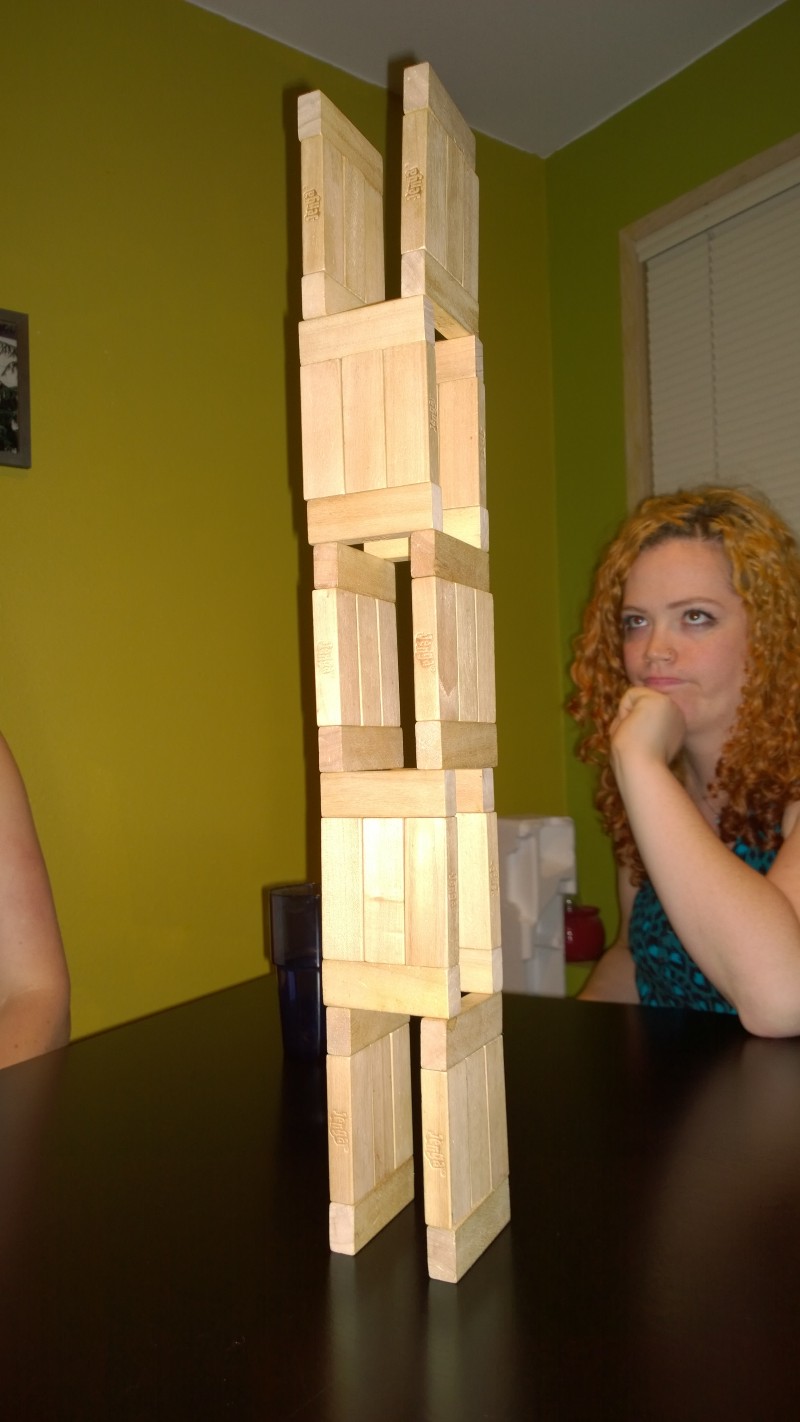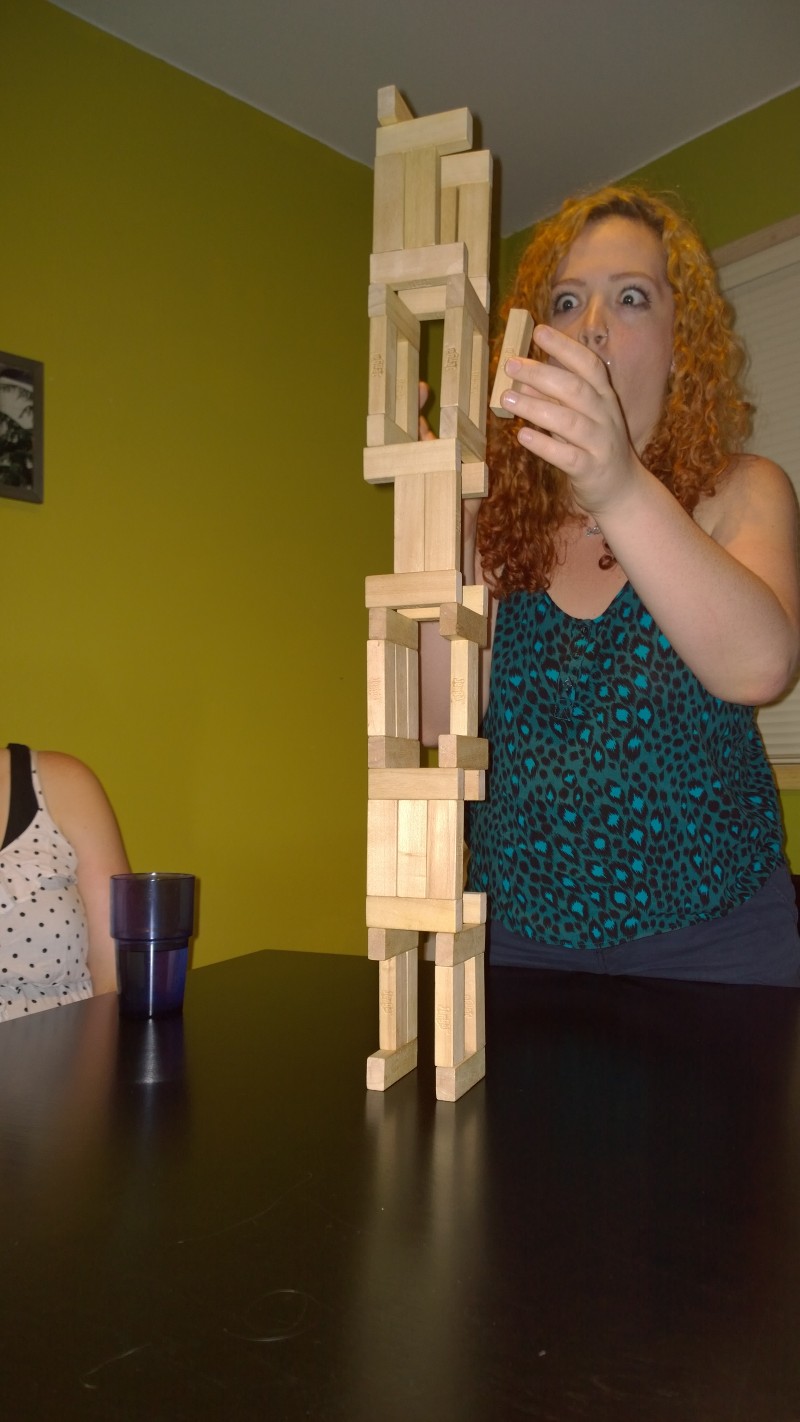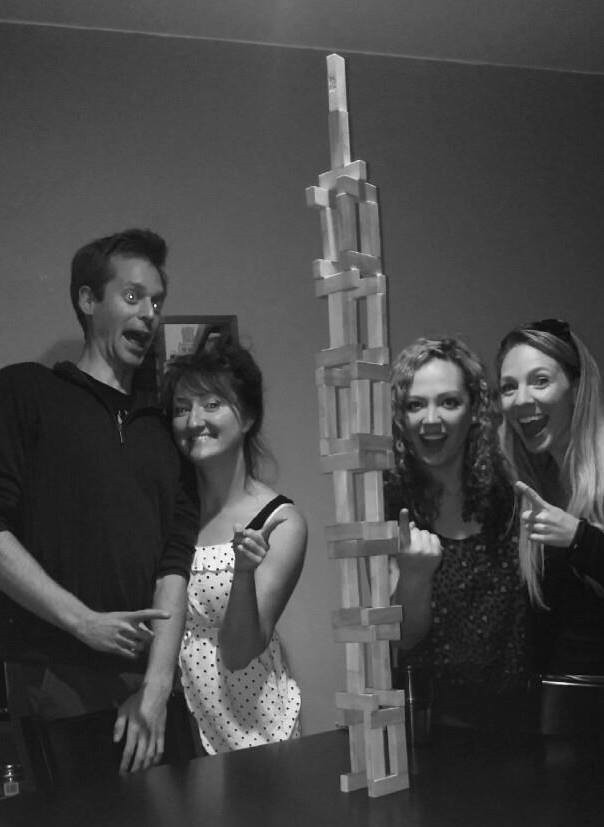
When the day began, I thought I had a pretty good sense of the upper limits of human dexterity and focus, two skills essential for my obsession at the time: extreme Jenga. But by the day’s end, those limits would be far surpassed and my general sense of human potential would be greatly expanded.
That evening, hanging out with three friends who had little to no Jenga experience, I set up what was sure to be a quick failure:

Just building this tower up to the starting point shown in the photo was incredibly hard. It was terribly unstable. And our objective, as with standard Jenga, was to pull pieces out and put them on top, following the pattern. We were playing cooperatively, trying to see how far we could get.
It was intense. Every move threatened to destroy the tower. It would quiver and wobble from the slightest touch. Yet somehow, we made progress.

In cooperative, extreme Jenga, “beating the game” means pulling all possible pieces without causing the tower to fall. At this point in my Jenga obsession, I had beaten many different – but easier – styles of tower. This style, I was sure, was far too unstable. It’s the hardest way I know of to play Jenga, after all. There was no way we were going to beat the game.
But with great care and mutual encouragement, we kept going, and my belief started to shift. We all became extremely focused. We all brought forth a steadiness of hand normally reserved for snipers and surgeons.
And we triumphed!

As this silly example shows, human beings are capable of truly amazing feats. We all possess an incredible potential that is uniquely human.
And we love to celebrate demonstrations of our incredible human potential. We worship professional athletes. We are mesmerized by Cirque du Soleil. There is even something called the “World Memory Championships” in which people demonstrate truly insane feats of memorization – not using innate talent, but using learned techniques.
The Dynamic Human Brain
We are capable of developing such incredible abilities because of the brain’s capacity for change and growth. Our neurons grow new connections whenever we learn, and those connections strengthen when we practice our skills. This is called neuroplasticity. Our brains also produce new neurons every day that serve to increase the strength of whatever brain regions we are actively exercising. This is called neurogenesis.
The Purpose of Our Potential
Of course, our incredible human potential should be used for more important things than extreme Jenga, shooting balls into hoops, bodily contortion, and memorizing long strings of numbers. And it is.
We created electric light and instantaneous long-distance communication. We invented democracy and public education. We figured out how to prevent and cure numerous diseases, dramatically increasing both the length and quality of human life. We put a man on the moon.
And our incredible human potential is about more than impressive feats of body and mind. It’s about more than innovation. We also have enormous potential for emotional resilience.
Consider Nelson Mandela, who spent 27 years as a political prisoner, but, rather than holding a grudge against his oppressors, cultivated forgiveness and reconciliation, helping unite South Africa and end Apartheid.1

Or consider Viktor Frankl, who, while suffering the worst of human potential – the Holocaust – dedicated himself to helping his fellow prisoners maintain personal dignity and emotional freedom.2
Role Models
When we’re doubting our own potential, we can look to those who have done great things. But we must be careful to see them as role models to follow, not as deities to worship. People who have done the seemingly impossible are no different from you and me. They are human beings who have simply learned to tap into their incredible human potential.
One of my role models is Dr. Barbara Oakley. Dr. Oakley struggled with math as a high school student, decided math wasn’t for her, and became a translator. But many years later, she resolved to figure out how to learn math, and indeed, how to learn anything. She became an expert in the psychology and neuroscience of learning, wrote a book about it, and co-created the most popular MOOC of all time. Oh, and she is now a professor of engineering.3
Hope
Dr. Oakley is a stellar example of someone with a growth mindset: She believes in her own capacity to grow and change. Envisioning your potential requires imagination, knowledge of the brain’s dynamic nature, and role models of success. Taken together, these create hope, and hope inspires the positive action necessary to make a dream into a reality.
Hope is important because we’re terrible at predicting our own emotional futures.4 Humans have a very hard time imagining our emotional potential, especially when we are angry, lonely, or depressed.

When we’re in the valley of despair, it can be impossible to see the mountaintop. It can be impossible to imagine ever being happy again. But we must believe that we do have that emotional potential. We must trust that the mountaintop is there and start climbing. Finding hope, then, is priority #1 for those suffering from depression.
Make Your Potential a Reality
Remember, though, that the world doesn’t care about your potential. It cares what you do, what you make, and who you actually become. It’s on you to prove your potential through hard work. Unleashing your incredible human potential requires productivity.
The path to your potential is best walked with tools in hand. Again, Dr. Oakley is a fantastic example of this. She didn’t just put her nose to the grindstone. She put in the hard work and used the best study techniques we know of. Realizing your incredible human potential requires strategy.
And lastly, it requires bravery. In their book, The Tools, Phil Stutz & Barry Michels make the case that “your infinite potential” is on the other side of your fears.5 It takes courage to steadily engage in the process of making uncertain dreams a reality. We will risk, and almost certainly encounter, failure. But mistakes and failures actually make us stronger.
But we also need to remember that this isn’t a black-and-white concept. Success isn’t all-or-nothing. Your incredible human potential lies at the end of an infinite spectrum. Any effort you make toward that ideal is worthwhile. Everything counts.
In the end, achieving your goal may be less important to you than the person you must become along the way. When you discover your incredible human potential and start living up to it, your life will never be the same.
“Deep within man dwell those slumbering powers, powers that would astonish him, that he never dreamed of possessing, forces that would revolutionize his life if aroused and put into action.” –Orison Swett Marden
Works Cited
1 “Nelson Mandela.” Wikipedia.
2 “Viktor Frankl.” Wikipedia.
3 Oakley, Barbara. A Mind for Numbers: How to Excel at Math and Science (Even if you Flunked Algebra). Penguin, 2014.
4 Gilbert, Daniel. Stumbling on Happiness. Vintage, 2007.
5 Phil Stutz & Barry Michels The Tools: 5 Tools to Help You Find Courage, Creativity, and Willpower–and Inspire You to Live Life in Forward Motion. Spiegel & Grau, 2013
Image Credit
Jenga photos: Loper, Chris, and Welling, Ashley.
